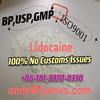CAS No.: 137-58-6
Molecular formula: C14H22N2O
Molecular weight: 234.34
EINECS number: 205-302-8
Melting point: 66-69 ° C
Boiling point : bp4 180-182°; bp2 159-160°
Storage conditions: Store at RT
Solubility ethanol: 4 mg/mL
Payment method: T/T,Western Union,Bitcoins,Money Gram
Certification: BP,ISO9001,USP,GMP
Customs issues: 100% No customs issues
Supply Capacity: 5000kg/1month
Appearance: White crystal powder or almost white crystalline powder
Packing: 1kg/aluminum foil bag,25kg/cardboard drum or as customers request
Delivery: Within 7-9 days
Standard: Pharmaceutical Grade
Application: Local anesthetic
Purity: 99%
Role: local anesthetics. Local anesthetic intensity: tetracaine>tetracaine hcl>lidocaine>lidcaine hcl> benzocaine > procaine>procaine hcl, but there are corresponding side effects. Mainly used for surface anesthesia of the eyes, nose, throat and urinary tract.
It can cause convulsions after absorption, and then it is converted to respiratory depression, and is generally not used for anesthesia such as infiltration and conduction. Widely used in hospitals, dentists, tattoos, fitness and extended male ejaculation delays
Note: Lidocaine hydrochloride is dissolved in water and is generally used as a liquid. Lidocaine is not dissolved in water and is generally used as a cream.
Lidocaine is a local anesthetic and antiarrhythmic drug. It is clinically used for infiltration anesthesia, epidural anesthesia, surface anesthesia (including in the thoracoscopy or abdominal surgery for mucosal anesthesia) and nerve conduction block.
The drug can also be used for acute myocardial infarction after ventricular premature beats and ventricular tachycardia, and for digitalis poisoning, cardiac surgery and ventricular arrhythmias caused by cardiac catheterization. But it is usually ineffective for supraventricular arrhythmias. 联系我时,请说是在88同城分类信息网看到的,谢谢!















